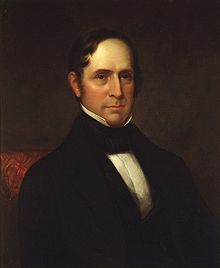Willie P. Mangum | |
|---|---|
 1844 portrait by James Lambdin | |
| President pro tempore of the United States Senate | |
| In office May 31, 1842 – March 3, 1845 | |
| Preceded by | Samuel L. Southard |
| Succeeded by | Ambrose Hundley Sevier (acting) |
| United States Senator from North Carolina | |
| In office November 25, 1840 – March 3, 1853 | |
| Preceded by | Bedford Brown |
| Succeeded by | David Reid |
| In office March 4, 1831 – November 26, 1836 | |
| Preceded by | James Iredell Jr. |
| Succeeded by | Robert Strange |
| Member of the U.S. House of Representatives from North Carolina's 8th district | |
| In office March 4, 1823 – March 18, 1826 | |
| Preceded by | Josiah Crudup |
| Succeeded by | Daniel Barringer |
| Personal details | |
| Born | May 10, 1792 Orange County, North Carolina, United States (now Durham County) |
| Died | September 7, 1861 (aged 69) Bahama, Durham County, North Carolina, Confederate States of America |
| Resting place | Mangum family cemetery Walnut Hall |
| Political party | Federalist (Before 1816) Democratic (Before 1834) Whig (1834–1852) American (1856–1861) |
| Spouse | Charity Cain m.1819 |
| Children | 5 |
| Education | University of North Carolina, Chapel Hill (BA) |
Willie Person Mangum (/ˈwaɪli ˈpɑːrsən/; May 10, 1792 – September 7, 1861) was an American politician and planter who served as U.S. Senator from the state of North Carolina between 1831 and 1836 and between 1840 and 1853. He was one of the founders and leading members of the Whig party, and was a candidate for president in 1836 as part of the unsuccessful Whig strategy to defeat Martin Van Buren by running four candidates with local appeal in different regions of the country.[1]
Most notably, Mangum served as President pro tempore of the Senate for most of John Tyler's presidency, between 1842 and 1845. He was, therefore, first in the presidential line of succession during this time, as Tyler did not have a vice president. (There was no constitutional mechanism for filling an intra-term vice presidential vacancy at the time.) Had Tyler died, resigned or been removed from office at any time during his presidency, Mangum would have become acting president of the United States.
- ^ Thompson, Joseph Conan (1995). Willie Person Mangum: Politica and Pragmatism in the Age of Jackson. University of Florida, George A. Smathers Library. p. 1. Retrieved September 14, 2014.